In this article:
Hibiscus is a beautiful red flower native to South Asian countries but is now cultivated in many countries around the world. The stems, leaves, calyces, and seeds of this flower are all used in many traditional medicinal systems. (1)
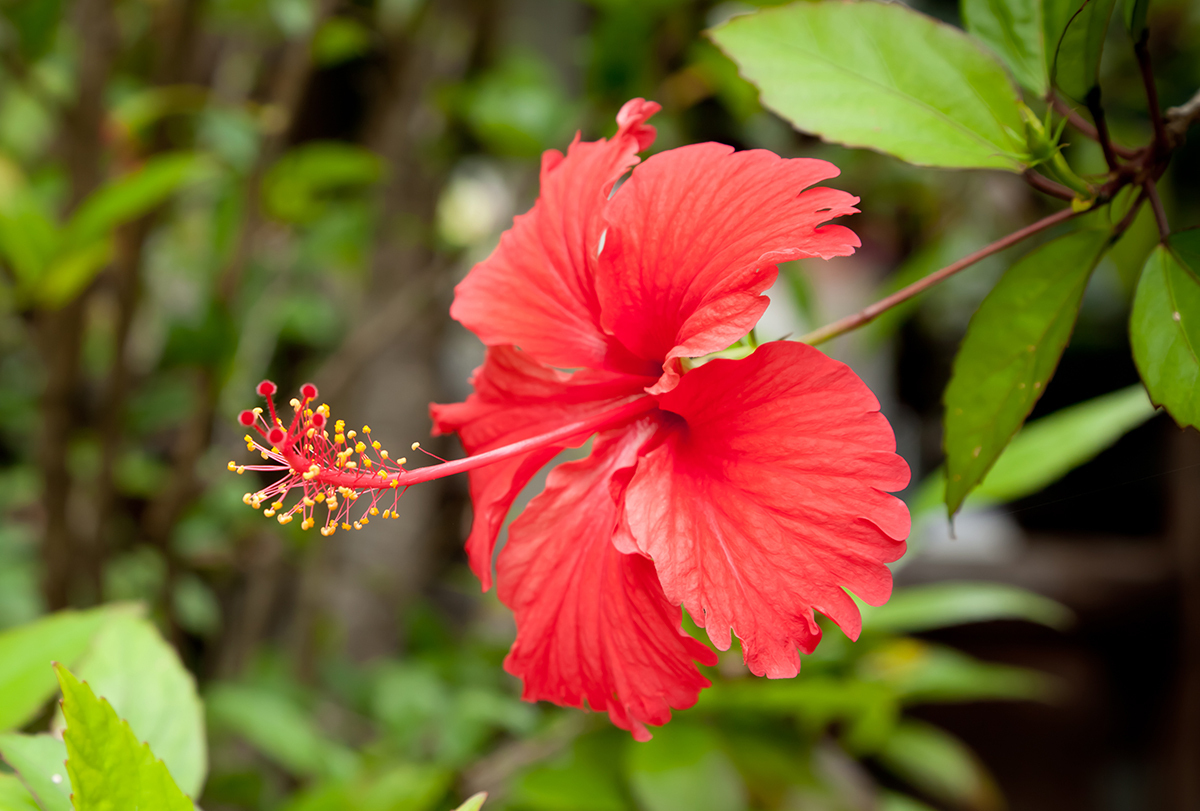
It is rich in beneficial phytochemicals including anthocyanins, polysaccharides, and organic acids that make it an effective remedy for many ailments. (1)
Top Health Benefits of Hibiscus
Here are some of the health benefits you can expect when you include hibiscus in your daily diet.
1. Can lower blood pressure
High blood pressure has become a common problem faced by many people. Uncontrolled or unmanaged blood pressure can lead to adverse health conditions involving the heart. It is therefore imperative that blood pressure be managed not just by medication but also by dietary modifications. (2)
Consuming hibiscus as tea has been recommended by Chinese traditional medicine.
In a study of people with hypertension, drinking 2 cups of hibiscus tea each day was significant in reducing hypertension. (2)
2. Helps manage cholesterol levels
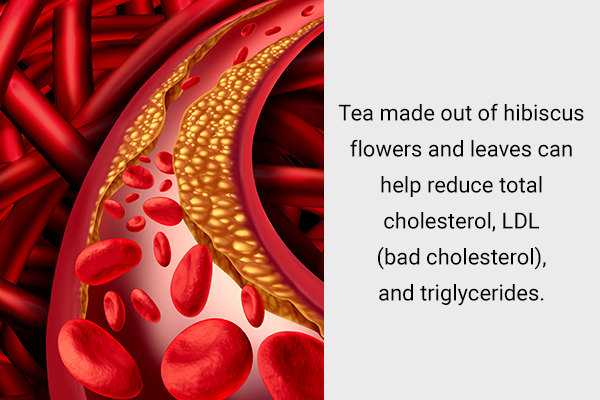
In addition to elevated blood pressure, unchecked blood cholesterol levels can also be harmful to heart health. The good news is that hibiscus can aid with both!
Tea made out of hibiscus flowers and leaves can help reduce total cholesterol, LDL (bad cholesterol), and triglycerides, according to reviews of several studies. (3)
3. Helps in blood sugar management
Elevated blood sugar levels and low insulin levels are characteristics of diabetes. Hibiscus has been studied for its role in improving both parameters to aid in the management and control of diabetes. (4)
The latest evidence-based review suggests hibiscus contains bioactive compounds that are beneficial in lowering blood sugar levels. While it has no significant role in improving insulin levels, it does protect the body from oxidative damage which is common in diabetes. (4)
4. Improves liver function
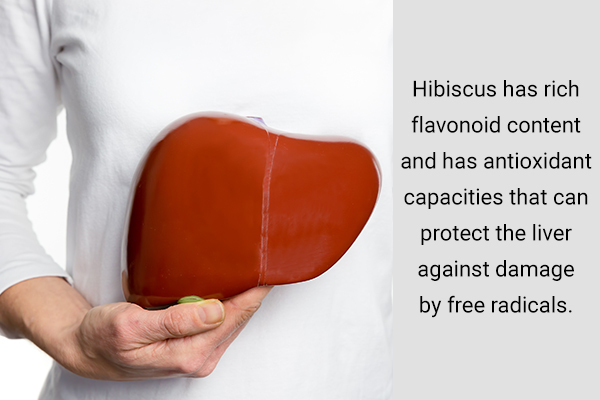
It has been suggested that hibiscus may also offer some protection to the liver. Its rich flavonoid content has antioxidant capacities that can protect the liver against damage by free radicals. (5)
In a study done on rats, the use of hibiscus extract was beneficial in normalizing the damage caused to the liver by elevated blood sugar levels. (5)
In another animal study, hibiscus reversed damage to the liver caused by high-fat diets. (6)
5. Keeps the kidneys healthy
Hibiscus’ antioxidant capacity also plays a protective role in the kidneys by normalizing toxicity induced by certain drugs. (7)
Chronic illnesses such as diabetes, high blood pressure, and chronic kidney disease (CKD) can damage the tissues within the kidneys, reducing their activity.
In animal studies, it was found that hibiscus was able to stop the progression of injury to the organs, prompting its use as a potential adjunct in the management of CKD. (8)
6. Helps fight infections
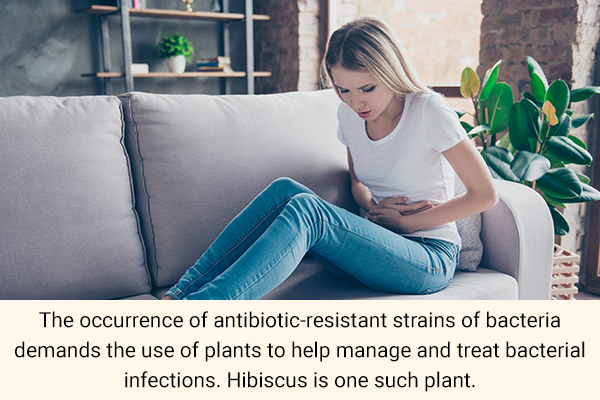
The occurrence of antibiotic-resistant strains of bacteria demands the use of plants to help manage and treat bacterial infections. Hibiscus flowers are one such plant. (9)
Studies have discovered hibiscus to be effective against 43 strains of bacteria including those resistant to antibiotics. It has also been found to inhibit the formation of H. pylori in the intestines, which is a major cause of stomach and digestive distress. (9)
Hibiscus flowers have also been found useful in preventing urinary tract infections caused by candida by preventing the bacteria from sticking against the wall of the urinary tract. (10)
7. Keeps skin healthy
Hibiscus flowers also find their use in cosmetics due to their antiaging ability. The rich antioxidant profile and other bioactive compounds of the plant offer protection against free radicals to improve skin health.
In studies done to investigate the potential of hibiscus in skin care, its leaves and flowers exhibited SPF ability and boosted collagen in the skin. (11) It can also reverse the damage to the skin due to UV radiation and reduce melanin production, preventing tanning and sunburns. (12)
Brewed hibiscus tea can be used for DIY skin care such as masks, toners, or facial mists.
8. Can help with weight management
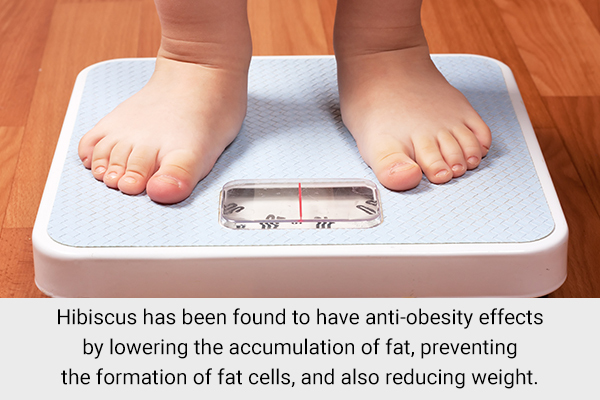
Obesity or excess weight can lead to severe health issues that can be simply avoided with the management of weight.
Recently, bioactive compounds from natural sources have been explored for their use in the fight against obesity, and hibiscus is among them. (13)
Studies have found hibiscus to have anti-obesity effects by lowering the accumulation of fat, preventing the formation of fat cells, and also reducing weight. (13)
9. Can influence the immune response
Hibiscus is also responsible for modulating the immune response of the body. It has been found to lower markers of inflammation and reduce water retention in the body, making it useful in the management of disorders caused by a hyperactive immune system. (14)
10. Can promote hair growth
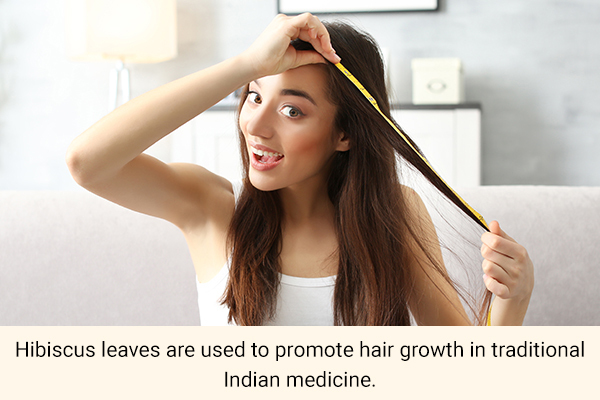
Hibiscus leaves are used to promote hair growth in traditional Indian medicine. Extracts of hibiscus can be used as a hair tonic as it has been shown to stimulate hair growth, proving to be useful for hair loss treatments. (15)
11. Can prevent cancer
Hibiscus also finds its use in the fight against cancer.
The consumption of hibiscus tea and its rich polyphenol content can influence the pathways responsible for the spread of cancer cells and can bring about cancer cell death. (16)
How to Consume
Hibiscus is most popularly consumed as a tea. You can also dry the fresh flowers and powder them. This can be added to smoothies, salad dressings, soups, and drinks.
How to Make Hibiscus Tea?
Simply brew a teaspoon in a mug of freshly boiled water for a few minutes. Since the flavor of this tea is quite sour, you can have it with lemon juice or honey.
Most-Asked Questions
Is it safe to drink hibiscus tea everyday?
Hibiscus tea is safe to consume in its prescribed daily doses. However, it is crucial to avoid overconsumption.
Who should avoid hibiscus?
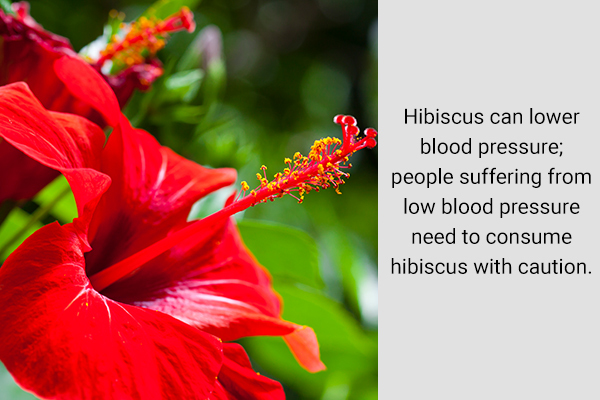
Since hibiscus can lower blood pressure, people suffering from low blood pressure need to consume hibiscus with caution. Additionally, check for allergies before you use hibiscus or its products (such as cosmetics).
Final Word
Hibiscus is a beautiful flower with a rich vibrant color that can be used to make dyes and natural food colors.
But it also contains a lot of beneficial polyphenols, flavanols, and flavonoids that offer many health benefits ranging from reducing blood pressure, managing diabetes, aiding weight loss, protecting the skin, and even reducing the risk of cancers.
It is key to avoid overconsumption to receive its full health benefits without risks.
- Was this article helpful?
- YES, THANKS!NOT REALLY


